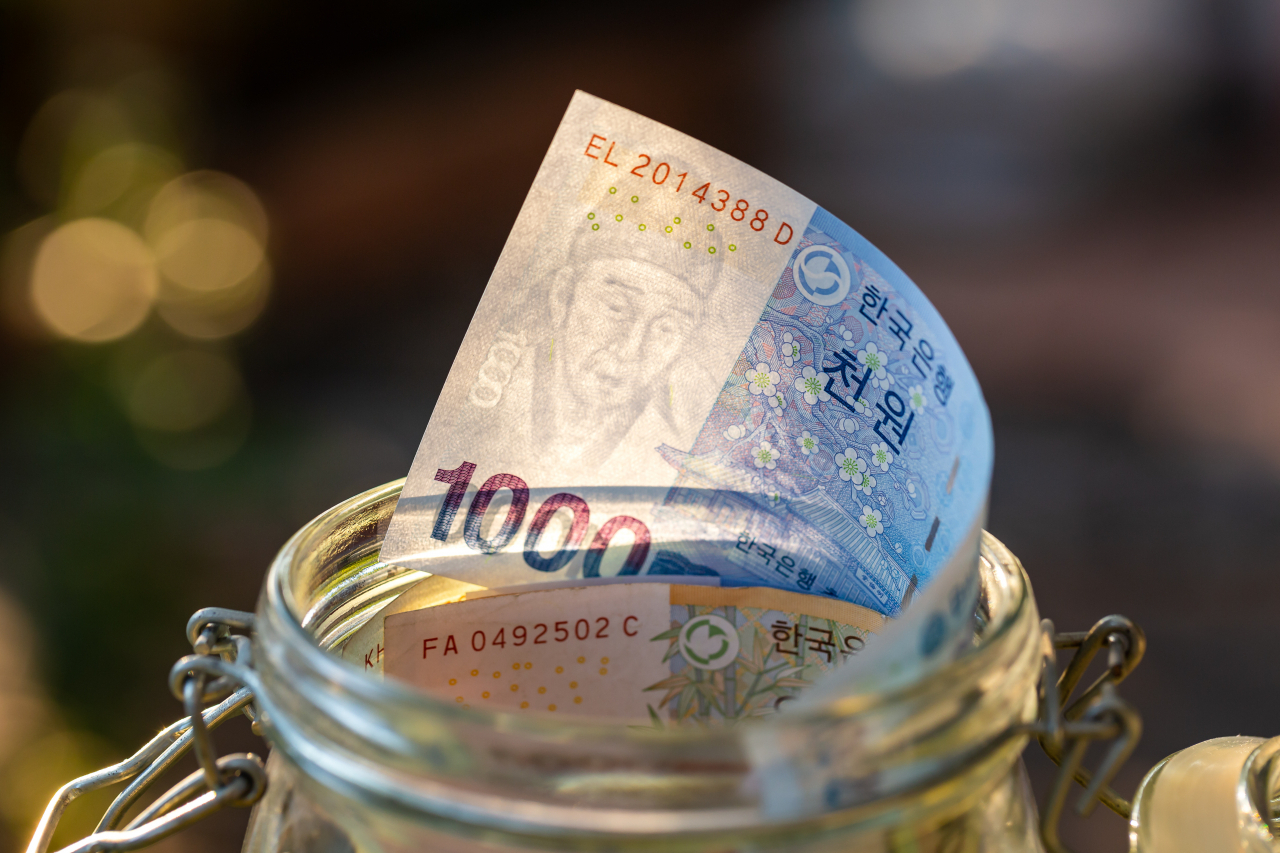Tipping culture sparks controversy among Koreans
Some local businesses’ requests for tips spark complaints from the public who are not familiar with tipping
By Yoon Min-sikPublished : Aug. 27, 2023 - 16:54

A popular Seoul-based bagel shop recently became a lightning rod when a photo from the shop went viral online. Sitting next to the cash register was a tip jar -- a sight that touched the nerves of many Koreans who feel store owners are shifting the burden of rising operating costs to consumers by attempting to introduce gratuities.
Tipping is not expected or practiced by customers in South Korea, but over the years, a few local businesses have started asking for tips. The bagel place in question is famous for having a London theme -- the irony being that tipping is not essential in the UK, particularly in shops like that one where customers pick out their own products and walk up to the cashier to pay for them.
Much of the general population remains negative toward the practice of tipping.
Kakao Mobility Corp., the operator of the nation’s biggest taxi-hailing service Kakao T, introduced a system last month where users can choose to add a tip to their fare when service was satisfactory. A recent survey by local pollster Open Survey showed that 71.7 percent of respondents said they are against the taxi platform’s tip function, with only 17.2 percent saying they are for it.
“Taxi fares are expensive enough, and it feels like asking for a tip is a way of sneakily raising the fare even higher,” a 36-year-old office worker surnamed Lee based in Seoul said.
The aforementioned survey showed that 53 percent of respondents thought that cab fares in Korea are "high," with 11.1 percent saying they are “very high.” Only 24.5 percent said taxi fares are "appropriate."
Why Korea has no tipping
Among the biggest complaints for stores asking for tips is that South Korean law states that business owners should notify the customers of the full prices of products, including value-added tax. As such, it is illegal to request service charges in addition to the prices that appear on the menu.
A customer voluntarily paying a tip due to being content with the service is not illegal, although the existence of the option of giving a tip also puts pressure on some Koreans who are not familiar with the practice.
“I was caught off-guard because I didn’t expect it (the tip jar) to be there. I didn’t want to look like a cheapskate so I put some 1,000-won bills in,” said 37-year-old Choi Yu-jin who recently went to a bar that had one of these jars.

Tipping practices around the world vary, and in countries like the US, leaving a bare minimum of 18 percent or more of the bill as a tip is not just seen as etiquette, but is assumed to be mandatory.
This is because tip earnings factor into the base wages for certain employees who receive a substantial portion of their income in tips -- US federal law defines "tipped employee" as those who regularly receive more than $30 per month in tips. The combination of regular wages and tips must amount to at least the minimum wage -- which differs in most states that have their own laws about the minimum wage.
In short, it is widely accepted in America that the tip is part of the service fee. In spite of this, recent surveys indicate that, amid high inflation, economic unease and the proliferation of businesses requesting tips, there is growing discontent toward tipping among the general population there as well.
No such law or perception exists in South Korea, where giving a tip is purely out of one’s personal gratitude for the service. For years, giving tips has been perceived as something exclusive to the financially affluent, a so-called “big-shot” move that boasts one’s social or financial status.
The main concern about tip culture is that it ultimately drives up the cost of services. As mentioned before, at restaurants in the US, the tip is often already factored into the price -- both parties in the transaction have an understanding that the tip is already part of the equation, and many employees get lower wages because of it.
But South Korea’s minimum wage is set regardless of the tip, meaning a tip on top of it would effectively drive up the cost for the consumer.
Tips -- good or bad?
Local businesses with the tip option insist that it is purely optional, but consumers are raising concerns that provisional services by industry leaders could eventually make tipping a regular thing.
“Given that (Kakao Mobility) is a dominant player in the industry, when the (tip) system becomes a regular one, a non-tipping consumer would feel guilty and reluctant in receiving service," said Lee Eun-hee, a professor of consumer science at Inha University, adding that the company should reduce their cut instead of shifting the cost to consumers.

In a survey by local polling company The Poll on Kakao T’s tip function -- in which 61 percent of the respondents said they are against it -- 57.3 percent said they are concerned that it could stick in Korean society, with other taxi-hailing companies following suit.
It has happened with delivery fees. Prior to the 2010s, it had been customary for eateries not to charge extra fees when providing delivery services.
But local businesses started charging delivery fees later in the decade, starting with Kyochon Chicken in 2018, and now nearly every company charges delivery fees.
There is an argument that introducing tips could improve the general quality of service. A team of researchers from the department of tourism management at Soonchunhyang University conducted a study on tipping at Japanese restaurants, among the places in the country where tipping is most common.
The study found a significant correlation between the tendency of customers to give tips and their expectation of quality service, along with the servers’ receiving tips and the tendency to give service of higher quality.
“For an employee, receiving a tip based on one’s ability to provide service can lead to satisfaction with one’s work and increased loyalty to one’s organization,” the authors wrote in the research paper, titled “Customers’ Perception Toward Tipping and Their Tipping Behavior: A Case Study of Japanese Restaurants in Korea.”
But, as mentioned above, the negative perception toward the proliferation of businesses requesting tips is something that is growing among the US consumers as well.
A 2023 survey by Bankrate, a consumer financial services company in the US, found that 66 percent of Americans have a negative view of tipping. The younger generation of consumers in particular were found to tip less than the older population, expressing discontent about what is being called “tipflation.”
Among the biggest complaints are those concerning gratuity prompts like the touch-screen tip payment system, which are visible to other members of the public and are accused of prompting “guilt-tipping.”
The same poll found that 41 percent of respondents feel that businesses should simply pay their employees better instead of relying on customers’ tips to boost their incomes.
Whether it is a tipping culture like the US or a traditionally non-tipping one like South Korea, many consumers say they are growing tired of being pressured to pay tips, particularly when they hardly received any form of service. In light of the public backlash, Kakao Mobility stressed that any coercion by the driver for customers to tip would be penalized, while the Seoul-based bagel store said the tip jar was “just for decoration.”
It remains to be seen whether such public reactions will lead to industries backpedaling on the issue, or if charging tips could become an industry norm as in case of delivery fees.








![[Weekender] How DDP emerged as an icon of Seoul](http://res.heraldm.com/phpwas/restmb_idxmake.php?idx=644&simg=/content/image/2024/04/25/20240425050915_0.jpg&u=)
![[KH Explains] No more 'Michael' at Kakao Games](http://res.heraldm.com/phpwas/restmb_idxmake.php?idx=644&simg=/content/image/2024/04/28/20240428050183_0.jpg&u=20240428180321)








![[Herald Interview] Mistakes turn into blessings in street performance, director says](http://res.heraldm.com/phpwas/restmb_idxmake.php?idx=652&simg=/content/image/2024/04/28/20240428050150_0.jpg&u=20240428174656)
